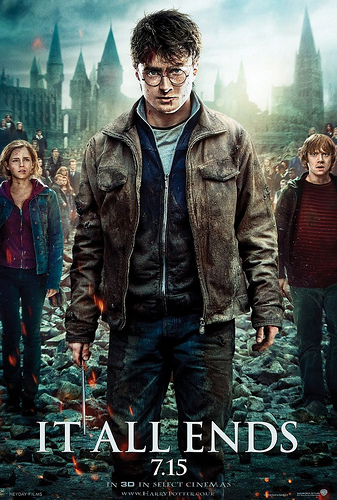
Future Fragments: Looking Back on 2011
Written by: Anastasia Salter, Pop-Culture Editor
 As we move forward into the year of a much-talked-about—perhaps even hoped for—apocalypse, it is perhaps appropriate that we look back on a year filled with chaos. As Time Magazine calls this the year of the protestor, and countries around the world have shifted with bloodshed and turmoil, there’s been similar upheaval in our popular culture. Most of the stories that will be remembered reflect this ongoing flux, as tremors shook distribution, major franchises drew to a close, and the stage has been set for an even more tumultuous new year. Here are a few highlights that portend interesting developments for 2012.
As we move forward into the year of a much-talked-about—perhaps even hoped for—apocalypse, it is perhaps appropriate that we look back on a year filled with chaos. As Time Magazine calls this the year of the protestor, and countries around the world have shifted with bloodshed and turmoil, there’s been similar upheaval in our popular culture. Most of the stories that will be remembered reflect this ongoing flux, as tremors shook distribution, major franchises drew to a close, and the stage has been set for an even more tumultuous new year. Here are a few highlights that portend interesting developments for 2012.
The Death of Borders. Independent bookstores have been dying at the hands of the mega-chains for decades, as You’ve Got Mail chronicled alongside yet another Meg Ryan-Tom Hanks love story. But Borders and Barnes and Noble seemed untouchable, with their megastores and integrated coffee shops. However, Amazon’s reign is secure, and other powerhouses like Best Buy look poised to follow—leaving browsing for pop culture purchases a thing of the past.
Women Trainwreck Comedies. On a lighter note, some surprisingly good movies popped up this year featuring women in leads typically played by men. In Bridesmaids, an entire “Hangover” worthy ensemble stumbled through a marriage plot, while Charlize Theron gave a stunning performance in Young Adult as a depressed alcoholic trying to recapture what she thought were her high school glory days. Hopefully some of the writers and actresses who stood out this year will stick around and continue to break some of the gender molds in mainstream comedy.
The End of Harry Potter. While the book series has been over for some time, 2011 saw the final film of Harry Potter—the franchise that could. It’s not all lost, as Pottermore is continuing the “official” story, the theme park continues to expand, and of course fans are still happily extending the world (and holding conventions)! But just as the series transformed the expectations of children’s literature, so too has the film series left its mark on cinema—growing up substantially from the early days of Chris Columbus’s installments to end with dignity and drama.
World of Warcraft’s Reign is Threatened. Players in massive multiplayer online games might have played something aside from World of Warcraft for the last several years—but they probably had a character in Azeroth too. Plenty of MMOs have tried to topple the titan, but the just-launched Star Wars: The Old Republic is one of the first to offer players something new. Will it topple WoW? Probably not. But it’s a glimpse of the changes on the horizon for a genre that seemed to be running out of ways to evolve.
A Return to Pseudo-Innocence. As pop culture continues to look for stories to reboot, it revisits the childhood of each generation. This year, Winnie the Pooh and The Muppets stood out among those returning to the big screen. Both held more than a tinge of the bittersweet, holding a sense of mourning not just for youth lost but for the end of the eras that could tell such stories. Even Spielberg got into the game with Tintin ending the year on incredible nostalgia.
Google Plus. Yes, the much-hyped Google social network is still around, even if it exists mostly to remind us how powerful Facebook and Twitter are in our lives and the spread of popular culture memes and movements. 2011 was also the year when everyone found out about Twitter, mostly thanks to scores of celebrities and public figures failing to use sound judgment when tweeting and thus reminding the rest of us how much damage a single 140 character message or picture can do.
The Death of Steve Jobs. In a year where so many deaths were experienced as simultaneous happenings, Steve Jobs stood above the rest. His legacy lives on in the very devices that so many read the news of his passing on, but his company will likely never be the same. The fusion of design, technology and innovation fueled by his passion has absolutely reshaped the consumer electronics that provide our lens to much of culture.
The Pepper-Spraying Cop. The Occupy movement found its perfect symbolic villain in the cop who casually pepper-sprayed a number of protesters, and the image has been re-imagined through the lens of every imaginable form in an ongoing meme, with the cop’s victims among Muppets, Pokemon, and even the Scream painting. He even inspired “Police Bear: The Cubby Cop,” a game by Anna Anthropy. Obscure? Perhaps. But this short game in a Choose Your Own Adventure style is a perfect commentary on the corruption of power and the escalating tensions surrounding the protests.
The Tenth Anniversary of 9/11. For the US, 9/11 has been omnipresent in cultural memory for a decade. This was a year of some resolutions and endings, but also of another transformation. The rhetoric surrounding discussion of the war, the memorial site, and even of ongoing prejudices is finally changing, and while the anniversary was marked with both reflection and mourning it also offered the reminder of how far we’ve moved from the jingoist oppressive silence that hung over popular culture a decade ago.
